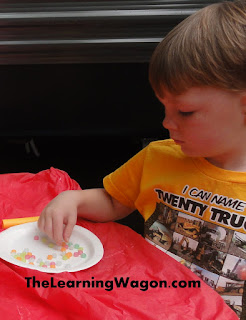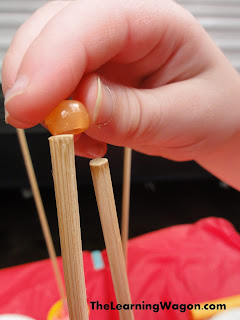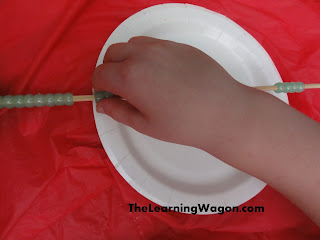This is a little activity
we’ve been playing for a while. Each time we play, we add more to the learning
experience! When we first started playing, it was for the purpose of building
finger muscles and hand-eye coordination, but as now we practice skills like recognizing
colors, patterning, sorting by color, counting, graphing, estimating, comparing
numbers, and more. The great thing about this activity is that there are few
materials needed and it is quick and easy set-up!
Materials:
Multi-Colored Beads – I used
Pony Beads that were pink, yellow, orange, blue, white, and green.
Wooden Kabob Sticks – You
will want to make sure the wooden sticks will fit through the hole of the beads
that you use.
Play Dough – You will need
the same color play dough as the beads that you choose to use if you are
working on colors.
Plate/Bowl – The
plate/bowl will keep the beads from rolling around and onto the floor while
your students are working on this activity.
Directions:
(Fine
Motor Skills)
Provide each student with
beads in a plate or bowl. Stick the pointy side of a kabob sticks down into play
dough while still in the container. Students pick beads from their plate or
bowl and push them down onto the kabob stick, but not to far as to push them
into the play dough.
(Color Recognition and Patterning)
Students place beads on
the kabob stick to create a pattern based on the colors of the beads. Have
students name the colors and identify the name of their pattern.
(Color Recognition and
Sorting)
For this activity, you
will need play dough colors that match your bead choice colors. Line the play
dough containers up and place one kabob stick in each. Students should name the
color of the bead they choose from their plate or bowl and place it on the
stick found in the matching play dough color.
(Graphing, Estimating, Comparing
Numbers)
This activity continues on
from the Color Recognition and Sorting activity found above. Once all the beads
have been placed on the appropriate sticks, have students look at the beads in bar-graph-like
fashion. Have them determine which bead color they have the most of and the least
of. Have students make a guess to determine how many beads they have in each
color.
(Counting and Comparing
Numbers)
Once all the beads have
been sorted by color, you can have students count how many beads are stacked
for each color. Caleb counted two different ways. First, he tried counting just
by starting at the bottom and pointing to each bead as he counted up the stick.
When that proved difficult, we laid the play dough container on its side so
Caleb could slide the beads one at a time to the right like an abacus. We didn’t
need to, but if there was a problem with beads sliding off the top, you could
stick another container of play dough on the opposite end. Once we count all
the sets of bead colors, we line them up from the smallest about to the largest
about. We talk about which colors equaled and what that means when we’re organizing
them in order.
If you love these activities and would like a resource to help encourage your students
to transfer their understandings from what they’ve learned to paper check out my product: Learning Beads (Counting & Cardinality).
I hope you are inspired to
bring some fun to your learning activities by reading my blog. I enjoy sharing
my ideas with you. I know teaching can feel overwhelming at times, especially
if you look at Pinterest for all your ideas, so I like to share ideas on how to
make learning fun and purposeful without a lot of preparation.
God Bless Your Learning
Journey!








No comments:
Post a Comment